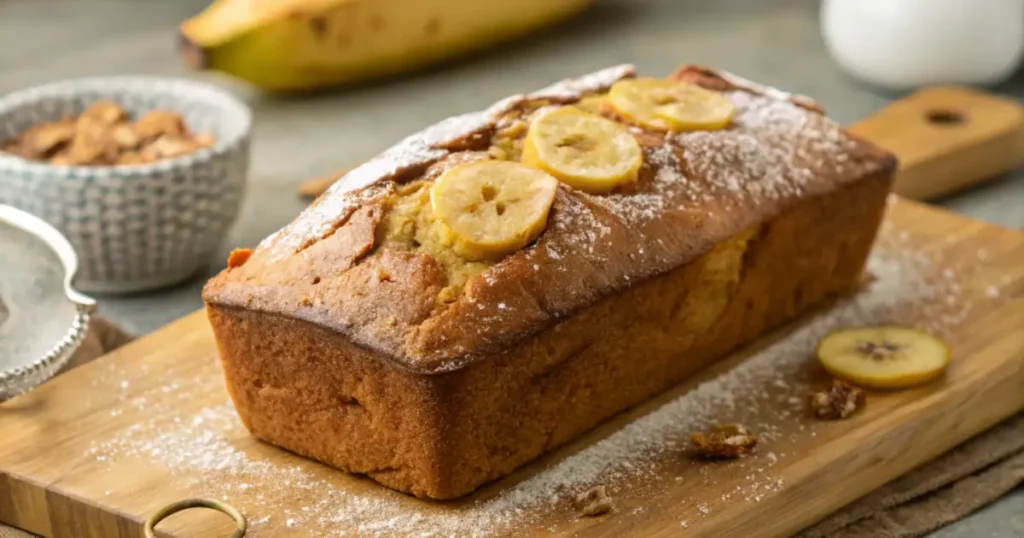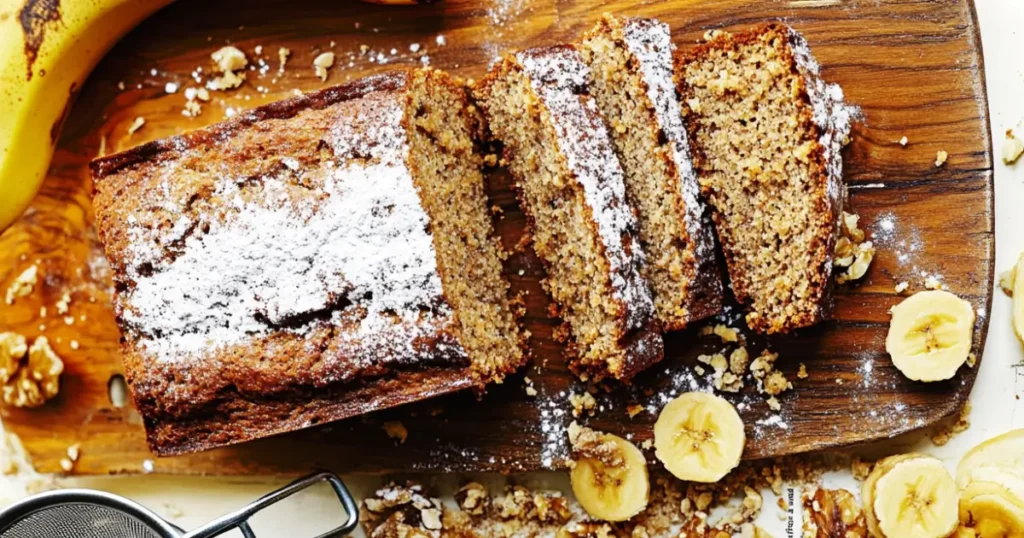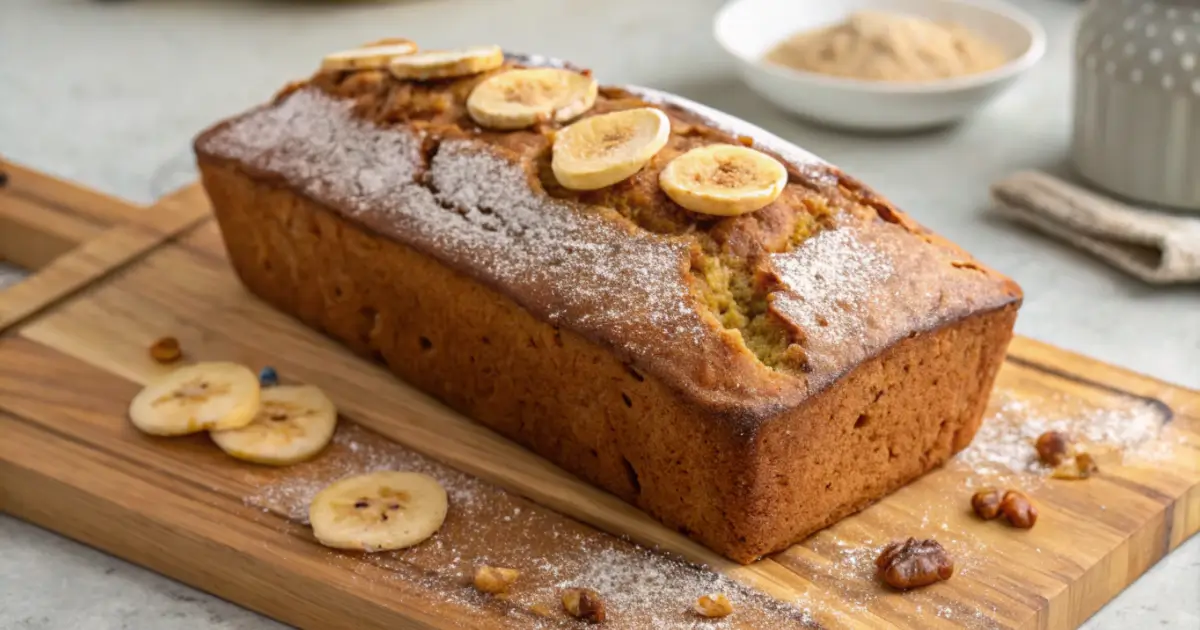Have you ever baked a banana cake that tasted bitter instead of the rich, sweet delight you expected? It’s a common baking woe, often leaving you scratching your head. Bitterness in banana cake can stem from several sources, like improper ingredient ratios, spoiled components, or even the bananas themselves. In this article, we’ll uncover the most likely culprits and guide you through avoiding them. From the nuances of baking soda to picking the perfect bananas, we’ll include your next banana cake is nothing short of perfection.
Table of Contents
Common Causes of Bitterness in Banana Cake
The Role of Baking Soda and Baking Powder in Bitterness
One of the primary reasons behind a bitter banana cake is the misuse of leavening agents, especially baking soda and baking powder. These essential ingredients help your cake rise, but when used incorrectly, they can wreak havoc on flavor.
Using too much baking soda can leave your cake tasting soapy or metallic. Why? Baking soda is alkaline, and without enough acidic ingredients like buttermilk or bananas to balance it out, the flavor goes awry. Baking powder, on the other hand, contains a mix of baking soda and acidic agents. If it’s added unevenly, pockets of bitterness can develop.
Uneven distribution is another hidden culprit. If baking soda isn’t fully mixed into the batter, you might bite into a bitter patch. To avoid this, always sift your dry ingredients and mix them well before combining with the wet components.
Why does banana cake taste bitter?(The Impact of Rancid Ingredients)
Baking with spoiled or rancid ingredients is a sure way to ruin your cake’s flavor. Nuts and oils are often overlooked, but they can turn bitter if stored improperly. For instance, walnuts, commonly added to banana cake, can spoil if kept in warm or humid conditions.
Old baking powder can also be problematic. If it clumps or absorbs odors in your pantry, it can impart an unpleasant taste. Always check the expiration dates and store ingredients in airtight containers to maintain freshness.

Quality and Ripeness of Bananas
Not all bananas are created equal when it comes to baking. While overripe bananas are perfect for their sweetness and soft texture, they can also carry an off-putting tang if they’ve fermented too much. On the flip side, underripe bananas lack the sweetness needed to balance the cake’s flavor, leaving it overly bitter.
Additionally, bananas treated with pesticides or stored improperly may contribute an unpleasant chemical taste to your cake. Opt for organic bananas and include they’re ripe but not overly mushy for the best results.
Ingredient-Specific Issues to Watch Out For
Baking Powder and Baking Soda Quality
When pondering “Why Does My Banana Cake Taste Bitter?”, the quality of your leavening agents often takes center stage. Baking powder and baking soda are sensitive to storage conditions and age. If baking powder contains aluminum (common in some brands), it may leave a metallic or bitter aftertaste. Switching to aluminum-free brands, like Rumford, can drastically improve your cake’s flavor.
Another often-overlooked issue is clumping. Baking powder and baking soda absorb moisture easily, which can lead to uneven mixing and concentrated bitter spots. Always store these ingredients in a cool, dry place, and replace them every six months for the best results.
Sifting is another critical step. If dry ingredients aren’t blended well, leavening agents can end up concentrated in one area. A quick sift or whisk include even distribution, reducing the risk of unpleasant surprises in your finished cake.
Buttermilk or Dairy Powders
Dairy-based ingredients, like buttermilk powder, are another potential source of bitterness. Each brand has its own formula, so it’s crucial to measure carefully and follow recipe-specific instructions. For example, one tablespoon in excess could overpower the natural sweetness of your bananas and tip the flavor scales.
If stored improperly, these powders can also go bad, resulting in a sharp or sour flavor. Keep buttermilk powder sealed tightly in the fridge and use it within the recommended time frame.
Flavoring Additives or Extracts
Vanilla extract and other flavor increases are vital for creating a rich, layered taste in banana cake. However, using too much or choosing low-quality brands can lead to bitterness. Pure vanilla extract is a better choice than artificial ones, which may include synthetic additives that taste harsh.

Techniques to Prevent Bitter Banana Cake
Mixing and Preparation Tips
A facilitate mixing process is the first step to avoiding bitterness. One common mistake when asking, “Why Does My Banana Cake Taste Bitter?”, is overmixing. Excessive stirring activates gluten, making your cake dense and slightly sour. Instead, gently fold your ingredients just until combined to maintain a light, fluffy texture.
Sifting your dry ingredients, especially baking soda and powder, include even distribution. For an added layer of security, combine the dry ingredients in one bowl and wet ingredients in another before mixing. This simple step reduces the risk of bitter patches from unevenly blended leavening agents.
Choosing the Right Bananas
Bananas are the star of the show, but picking the wrong ones can lead to a disappointing bake. Always opt for bananas that are just ripe—yellow with a few brown specks. Overripe bananas may ferment, creating an off taste, while underripe ones lack the natural sugars needed to counteract bitterness.
When in doubt, smell and taste-test your bananas before mashing them into your batter. If they have a tangy or alcoholic odor, it’s best to avoid using them.
Storage of Ingredients
Freshness is critical when it comes to your cake’s ingredients. Nuts, oils, and leavening agents are especially prone to spoilage. Store nuts in the fridge or freezer to keep them fresh longer. Similarly, oils should be kept in a cool, dark place to prevent rancidity.
Leavening agents like baking powder and baking soda lose potency over time, so mark the date you open them and replace them regularly. Proper storage not only keeps your ingredients fresh but also safeguards your cake’s flavor.
Troubleshooting Bitter Banana Cake
Identifying the Problem Post-Bake
So, you’ve baked your banana cake, and it has a bitter taste. Now what? One effective way to pinpoint the problem is to take note of the bitter areas. Are they scattered throughout the cake or localized to specific spots? Bitter pockets often indicate uneven mixing of baking soda or baking powder.
Next, analyze the texture. Dense areas in the cake could suggest overmixing or excessive leavening agents. On the other hand, if the bitterness feels more like a rancid flavor, ingredients like nuts or oils might be the culprits. Taste-test your nuts and sniff your oils before using them in future recipes to avoid this issue.
Adjusting the Recipe for Future Success
Tweaking your recipe can make all the difference in preventing bitterness. If you’re frequently wondering, “Why Does My Banana Cake Taste Bitter?”, start by reducing the amount of baking soda or switching to aluminum-free baking powder.
Another useful tip is to combine and sift all your dry ingredients thoroughly before mixing them with the wet ones. This simple adjustment include that every bite of cake is balanced and delicious.
Finally, experiment with other natural sweeteners or spices, like cinnamon or nutmeg, to enhance the cake’s flavor while masking any residual bitterness.
For more delicious banana cake ideas, check out the Classic Banana Flip Cake Recipe.
FAQs: Frequently Asked Questions
Why Does My Banana Cake Taste Bitter?
Bitterness can stem from multiple factors, including an excess of baking soda, improperly ripened bananas, or rancid ingredients. Start by reviewing your recipe’s measurements and include your ingredients are fresh and stored properly.
How Do I Prevent Bitter Pockets in My Cake?
Bitter pockets are often caused by uneven mixing of baking powder or baking soda. To avoid this, sift all dry ingredients together before adding them to your batter.
Can Overripe Bananas Ruin the Flavor of My Cake?
Yes, overly fermented bananas can introduce a tangy or bitter taste to your cake. Stick to bananas that are soft and sweet but not mushy or overly spotted.
What Are the Best Substitutes for Baking Soda or Powder?
If you’re out of baking soda, try using double the amount of baking powder, and vice versa. Keep in mind, though, that substitutions may slightly alter the cake’s texture.
Ready to craft your next perfect banana cake? Let me know if you’d like help summarizing the article or drafting a conclusion!
Pro Tips for Achieving the Perfect Banana Cake Flavor
Enhancing Sweetness Naturally
If you’ve ever wondered, “Why Does My Banana Cake Taste Bitter?”, it might be because the cake lacks balance. Sweetness naturally counters bitterness, so using ripe bananas is critical. To enhance sweetness further, consider adding a touch of honey or maple syrup to the batter. These natural sweeteners not only raise the flavor but also add moisture to your cake.
Brown sugar is another fantastic option. Unlike granulated sugar, brown sugar includes molasses, which introduces a deeper, richer sweetness to balance any lingering bitterness.
Using Spices and Add-Ins for a Flavor Boost
A pinch of cinnamon or nutmeg can work wonders in masking any bitterness in banana cake. These warm spices pair beautifully with bananas, creating a comforting flavor profile that’s hard to resist.
Add-ins like chocolate chips, shredded coconut, or even a handful of chopped nuts can also make a big difference. Not only do they add texture, but they also provide bursts of sweetness or richness that complement the bananas.
To avoid overpowering the cake, use these add-ins sparingly. A quarter to half a cup of any mix-in is typically enough to transform the flavor while keeping the balance intact.
Key Takeaways for Bitter-Free Banana Cake
Understanding the Science Behind Bitterness
Bitterness in banana cake is often a sign that something has gone slightly awry, whether it’s ingredient quality, measurement, or technique. Recognizing the role of each component in your recipe helps you pinpoint and resolve issues effectively. For example, too much baking soda leads to an alkaline aftertaste, while rancid nuts or oils can turn the entire cake bitter.
Steps for Consistent Success
If you want to include your banana cake always turns out delicious, follow these foolproof tips:
- Always measure your ingredients accurately using a kitchen scale or proper measuring cups.
- Use ripe but not overly soft bananas for the best balance of sweetness and flavor.
- Store your baking powder, nuts, and flours in airtight containers to maintain freshness.
- Sift your dry ingredients before mixing to avoid bitter pockets.
- Experiment with natural sweeteners and spices to customize the flavor.
When you take the time to choose quality ingredients and prepare them carefully, you’re far less likely to end up asking, “Why Does My Banana Cake Taste Bitter?”.
Ready to bake your perfect banana cake? For more baking inspiration, check out the Easy Banana Flip Cake Recipe.
Common Mistakes to Avoid for a Perfect Banana Cake
Overmixing the Batter
One of the easiest ways to ruin your banana cake is by overmixing the batter. This common mistake not only makes the cake dense but can also highlight bitter flavors. When mixing, always stop as soon as the ingredients are just combined. Overmixing activates the gluten in the flour, which can lead to a chewy, unpleasant texture and amplify any bitterness from leavening agents.
A helpful tip is to fold the batter gently using a spatula instead of a whisk or mixer. This keeps the texture light and include even distribution of ingredients, minimizing the risk of bitter pockets.
Using the Wrong Ingredients
If you’re still asking, “Why Does My Banana Cake Taste Bitter?”, double-check the quality of your ingredients. Substituting margarine for butter or using synthetic vanilla extract can negatively impact the flavor. Always stick to high-quality, fresh ingredients to achieve the best results.
Another common error is using bananas that are either underripe or overly ripe. Underripe bananas lack natural sweetness, while overly ripe ones can ferment, creating off flavors. Aim for bananas with brown speckles but no mushy spots.
How to Rescue a Bitter Banana Cake
Masking Bitterness with Toppings
If you’ve baked a banana cake only to discover it’s bitter, don’t worry—there are ways to save it. Adding a sweet topping, like cream cheese frosting or a drizzle of caramel sauce, can balance out the bitterness. These toppings not only increase the sweetness but also create a more indulgent dessert that distracts from any flaws.
For a simpler fix, dust your cake with powdered sugar or cocoa powder. These light additions can subtly mask bitterness without overwhelming the cake’s flavor.
Repurposing the Cake
Another option is to repurpose your bitter banana cake. Cut it into cubes and turn it into a trifle by layering it with whipped cream and fruit. This approach dilutes the bitterness and transforms your cake into a new dessert.
Alternatively, crumble the cake and use it as a base for cake pops or as a topping for yogurt or ice cream. These creative uses include that your hard work doesn’t go to waste while creating a treat that no one will suspect started as a baking mishap.

